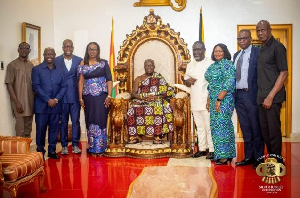- Home - News
- TWI News | TV
- Polls
- Year In Review
- News Archive
- Crime & Punishment
- Politics
- Regional
- Editorial
- Health
- Ghanaians Abroad
- Tabloid
- Africa
- Religion
- Election 2020
- Coronavirus
- News Videos | TV
- Photo Archives
- News Headlines
- Press Release
General News of Wednesday, 2 October 2013
Source: Public Agenda
Comment: Ghanaians cry for electoral reforms
It is inevitable that our young democratic structures, especially our electoral process, will have to go through a lot of reviews both now and in the future in order to achieve a perfect system. The Supreme Court verdict on the 2012 presidential election petition points to the need for an overhaul of the electoral system.
I agree with the concerns of the Supreme Court about our electoral systems. Hence I offer a few suggestions as to how to achieve the envisaged improvement.
First and foremost, it must be pointed out that the Electoral Commission (EC) must not be a power onto itself. While I recognise that the EC is an organ created by the 1992 Constitution, it must be stressed that it is also an institution created to serve the needs of the citizenry. Therefore, it would be wrong for it to jumpstart the reform process by just asking only political parties to send proposals for consideration. I am of the view that the invitation must go to all stakeholders, including academia and civil society.
I propose that EC should come out with a new comprehensible C.I. 75, clearly defining what over-voting, foreign materials and who pink sheet signatories are. Anything short of that is tantamount to an invitation to our political parties' representatives to arm themselves with clubs and other weapons to defend ballot boxes at collation centres.
On Election Day, representatives of all political parties at the various collation centres together with the EC officials should co-ordinate the election results to certify the winning presidential candidate and parliamentary candidate in that constituency. Any result from the EC which falls outside the party's representatives co-ordinated results must be subjected to reconciliation to get the true results. We should not rush to declare results.
An informal interview I conducted with some constituents in my area, Old Bortianor, unearthed the issues below. Mr Thomas Hanyo, a mechanic, suggested that the verification equipment should be modified to give 100 per cent efficiency to avoid eligible voters from being disenfranchised.
Pastor Kwabena Asah was of the view that if the EC and the Supreme Court judges educate Ghanaians on what over-voting and foreign materials are, they will contribute meaningfully to the proposed reforms.
He said the masses have lost confidence in the Supreme Court judges because of their judgement on the election dispute. He said Ghanaians need parallel voting tabulators from all shades of the political spectrum.
Mr Solomon Gyaadu, businessman, said he does not see much problem with the court verdict and therefore prompting any special reforms. To him, the electoral process has always undergone reforms since 1992. He cited the photo I.D. cards which went through several reforms. He said the biometric verification system is okay, but needs improvement.
Mr Kofi Nuhu, a civil servant, recommended that Ghanaians should adopt electronic voting and advised the EC to consult India on that. He said that would make the election process water-tight. In this regard, he referred to Dr Kwadwo Afari-Gyan's popular slogan, saying “As for election, vigilance is the key.”
From his perspective, the Commissioner should not only introduce unilateral changes but also should hold work jointly with the political parties. He also called on the EC and the political parties to implement the reforms proposed by the Supreme Court.











